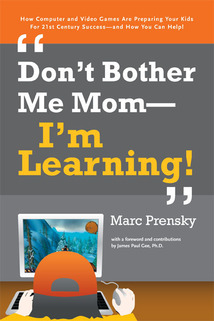
The reason kids are so attracted to these games, Prensky says, is that they are learning about important “future” things, from collaboration, to prudent risk taking, to strategy formulation and execution, to complex moral and ethical decisions. Prensky’s arguments are backed up by university PhD’s studying not just game violence, but games in their totality, as well as studies of gamers who have become successful corporate workers, entrepreneurs, leaders, doctors, lawyers, scientists and other professionals.
Because most adults (including the critics) can’t play the modern complex games themselves (and discount the opinions of the kids who do play them) they rely on secondhand sources of information, most of whom are sadly misinformed about both the putative harm and the true benefits of game-playing. This book is the antidote to those misinformed, bombastic sources. Full of common sense and practical information, it provides parents with a large number of techniques approaches they can use – both over time and right away – to improve both their understanding of games and their relationships with their kids. (Author’s description of the book from marksprensky.com) Related item Visit Mark Prensky’s website, where he has posted a wide variety of articles related to technology and learning. Prensky’s thoughts should be of interests to teachers, parents, and students, indeed anyone who has spent time pondering the changes brought about by the endeavour to live, communicate and learn in a digital world. |
Abundant research studies of health determinants, neuroscience, early childhood, and human and social capital affirm the substantial influence of non-formal learning in the family and community. Featured VideoPrograms at Work |



